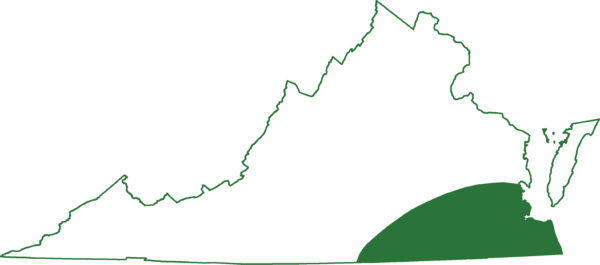Fact File
Scientific Name: Desmognathus auriculatus
Classification: Amphibian
Size: Up to 6.5 inches
Identifying Characteristics
Holbrook’s Southern Dusky Salamander is brown to black with 1–2 rows of white spots on each side. The belly is gray-brown to black with small white speckles. The tail is laterally compressed, sharpening towards the tip. Like all Dusky Salamanders, there is a light stripe from each eye extending backwards to the base of the jaw.
Distribution:
This species occurs in the Coastal Plain of Virginia, west to the middle of Mecklenburg County. They are found in leaf litter packs around the banks of slow mucky streams, swamps, or muddy pools.

Did You Know?
Unlike pond-breeding salamander larvae that have nonfunctional limbs, stream breeding salamanders have fully functional limbs.
Role in the Web of Life
These nocturnal predators consume a variety of small invertebrates and are also known to be cannibalistic. Mating probably occurs in spring with females laying 9–20 eggs in cavities near water in late spring to summer. Females remain with the nest until eggs hatch in the fall. Metamorphosis occurs the following spring.
Conservation
Species appears to be secure in Virginia.
Last updated: July 18, 2024
The Virginia Department of Wildlife Resources Species Profile Database serves as a repository of information for Virginia’s fish and wildlife species. The database is managed and curated by the Wildlife Information and Environmental Services (WIES) program. Species profile data, distribution information, and photography is generated by the Virginia Department of Wildlife Resources, State and Federal agencies, Collection Permittees, and other trusted partners. This product is not suitable for legal, engineering, or surveying use. The Virginia Department of Wildlife Resources does not accept responsibility for any missing data, inaccuracies, or other errors which may exist. In accordance with the terms of service for this product, you agree to this disclaimer.

